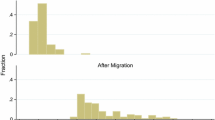Abstract
This article provides theoretical reasoning and empirical evidence that international migration decisions are influenced by relative as well as absolute income considerations. Potential gains in absolute income through migration are likely to play an important role in households’ migration decisions, but international migration by household members who hold promise for success as labor migrants can also be an effective strategy to improve a household’s income position relative to others in the household’s reference group. The findings reported in this article provide empirical support for the hypothesis that relative deprivation plays a significant role in Mexico-to-U. S. migration decisions. The findings also suggest that this migration is an effective mechanism for achieving income gains in households that send migrants to the U.S. and that households wisely choose as migrants those of their members who are most likely to provide net income gains.
Similar content being viewed by others
References
Chiswick, B. R. 1978. The effect of Americanization on the earnings of foreign-born men. Journal of Political Economy 86:897–921.
Cornelius, W. A. 1978. Mexican Migration to the United States: Causes, Consequences and U.S. Responses, Migration and Development Monograph c/78-9. Cambridge, Mass.: MIT Center for International Studies.
Crosby, F. 1979. Relative deprivation revisited: A response to Miller, Bolce, and Halligan. American Political Science Review 73:103–112.
Heckman, J. 1979. Sample section bias as a specification error. Econometrica 47:153–162.
Hyman, H., and E. Singer (eds.) 1968. Readings in Reference Group Theory and Research. New York: Free Press.
Johnson, G. E., and W. E. Whitelaw. 1974. Urban-rural income transfers in Kenya: An estimated remittances function. Economic Development and Cultural Change 22:473–479.
Lee, L. 1978. Unionism and wage rates: A simultaneous equations model with qualitative and limited dependent variables. International Economic Review 19:415–433.
Lucas, R. E. B., and O. Stark. 1985. Motivations to remit: Evidence from Botswana. Journal of Political Economy 93:901–918.
Merton, R. K., and A. S. Kitt. 1950. Contributions to the theory of reference group behavior. Pp. 40–105 in K. K. Merton and P. F. Lazarsfeld (eds.), Contributions in Social Research, Studies in the Scope and Method of “The American Soldier.” Glencoe, Ill.: Free Press.
Mincer, J. 1974. Schooling, Experience and Earnings. New York: Columbia University Press.
Oberai, A. S., and H. K. M. Singh. 1980. Migration, remittances and rural development: Findings of a case study in the Indian Punjab. International Labor Review 119:229–241.
Piore, M. J. 1979. Birds of Passage: Migrant Labor and Industrial Societies. Cambridge, U.K.: Cambridge University Press.
Runciman, W. E. 1966. Relative Deprivation and Social Justice: A Study of Attitudes to Social Inequality in Twentieth-Century England. Berkeley: University of California Press.
Stark, O. 1978. Economic-Demographic Interactions in Agricultural Development: The Case of Rural-to-Urban Migration. Rome: U.N. Food and Agriculture Organization.
— 1984a. Rural-to-urban migration in LDCs: A relative deprivation approach. Economic Development and Cultural Change 32:475–486.
—, 1984b. Discontinuity and the theory of international migration. Kyklos 37:206–222.
Stark, O., and R. E. B. Lucas. 1988. Migration, remittances and the family. Economic Development and Cultural Change 36:465–481.
Stark, O., and S. Yitzhaki. 1988. Labour migration as a response to relative deprivation. Journal of Population Economics 1:57–70.
Stouffer, S. A., E. A. Suchman, L. C. DeVinney, S. A. Star, and R. M. Williams, Jr. 1949. The American Soldier: Adjustment During Army Life. Princeton, N.J.: Princeton University Press.
Taylor, J. E. 1986. Differential migration, networks, information and risk. Pp. 147–171 in O. Stark (ed.), Migration, Human Capital and Development. Greenwich, Conn.: JAI Press.
— 1987. Undocumented Mexico-U.S. migration and the returns to households in rural Mexico. American journal of Agricultural Economics 69:626–638.
Yitzhaki, S. 1979. Relative deprivation and the Gini coefficient. Quarterly Journal of Economics 93:321–324.
— 1982. Relative deprivation and economic welfare. European Economic Review 17:99–113.
Author information
Authors and Affiliations
Rights and permissions
About this article
Cite this article
Stark, O., Taylor, J.E. Relative deprivation and international migration oded stark. Demography 26, 1–14 (1989). https://doi.org/10.2307/2061490
Issue Date:
DOI: https://doi.org/10.2307/2061490




